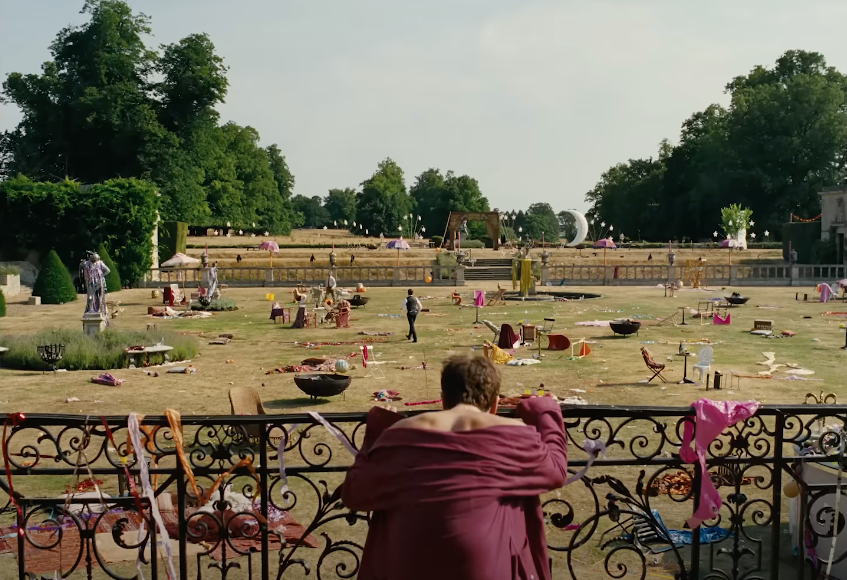Craft
What If You Can’t Afford “A Room of One’s Own”?
The writing community needs to start talking openly about financial insecurity

When I first read Virginia Woolf’s dictum that “A woman must have money and a room of her own if she is to write fiction,” I was homeless.
It wasn’t what most people picture when they think of homelessness. I wasn’t sleeping in the street but on couches and floors. I sometimes also shared a bed with a man when I didn’t want to. There were times I was stuck in the rain with two suitcases and no money, not knowing where I would sleep, with a bad cold, feeling like the gum on someone’s shoe. For a while, I kept all my belongings in a locker at the train station like a character in a ’70s movie. One night I couldn’t find a place to stay, so I just walked around the station all night and waited for dawn to come. Another time, the toiletries and change of clothes I always carried in a shopping bag were stolen, and when I asked about it at the station’s lost and found, I was treated with such contempt I started to cry. I stumbled off, sobbing about my lost soap and underpants, worthless junk the thief must have thrown away, but which I could not afford to replace. Most of all, I remember it as a time of walking in the cold, not having enough money to go into a cafe and order a coffee; looking at the outsides of buildings, the windows of restaurants, the warm life I couldn’t afford. I also remember my bitterness that I was expected to beg for a job I found pointless or wrong, just so I could exist in space, and the begging wasn’t even made easy; to do it, I needed a telephone number and decent clothes — things I couldn’t imagine ever being able to have again.
I’ve still almost never had a room of my own with a door that locks, as Woolf says I must have to write. Until I was 40, I never earned the minimum amount Woolf tells me I must earn — £500 a year, or roughly $40,000 in 2019 dollars. In some years, I don’t earn that now. I still think of anyone with no realistic fear of homelessness as rich.
But I’ve written eight books.
Before I go on, I feel I have to make it clear that this essay is not about “grit” — or any other imaginary virtue poor people need before they’re allowed to make art. I’ve never had grit. I’m an emotional mess. One of the reasons I was poor so long is that, no matter how I tried to be tough, I had chronic anxiety and cried over anything and never lasted long at a terrible job.
This essay is not about ‘grit.’ I’ve never had grit. I’m an emotional mess.
This is also not an essay about how becoming a writer raised me out of poverty. My childhood was middle class, and my dedication to writing was one of the things that made me fall into poverty in the first place. And mine is not such an unusual case. Being a novelist requires a huge initial investment of unpaid labor. Writing a first novel typically takes two years. After that, few first novels sell, and when they do, the average advance is in the region of $10,000.
Nonetheless, many writers keep their heads above water, even if they don’t have early success. Some manage to split themselves in two and pursue another profession while writing in their spare time. Some find an undemanding day job that pays enough to give them security. Some marry people with money.
But there are plenty like me who are perennially broke, always ending up on someone’s couch, always letting someone else pick up the check. I know half a dozen published authors who’ve had to rely on food stamps. The seedy poverty of the author has been a cliché for centuries. We find the figure of the poor writer already in the medieval era, in the form of poet-clerics called “goliards,” who begged and sang ribald songs in taverns as they wandered from monastery to monastery. Hundreds of years later, in the Beat Generation, the type survived with no essential change. Now a new generation of writers are confronting ever lower and less reliable payment for articles, stingier advances for books, fewer jobs, and smaller royalty checks. A host of new threats to writers’ livelihoods, from internet piracy to the slow-motion collapse of the academic job market, means ever fewer writers are making a middle-class wage.
Yet the public presentation of the profession remains stubbornly bourgeois. The acknowledgements pages of books tend toward lists of prestigious grants, residencies, and thanks given for the gracious loan of someone’s house in the Florida Keys; I’ve never seen anyone acknowledge the SNAP program or Medicaid, although they’ve almost certainly funded far more writers than the NEA. Even when a novel is marketed as a depiction of the working poor by a working-class writer, the press around the book usually suggests that the author, by becoming an author, has now escaped that underworld. Of course this isn’t always true — the author may not have “escaped” and doesn’t necessarily think it’s an underworld — but that narrative tends to creep into every crack. I’ve even seen an interviewer suggest a writer had left his problems behind when the writer was still living in a federal prison.
This construct also affects the kinds of books commercial publishers buy and promote. Memoirs about poverty — especially those pushed as potential bestsellers — are usually about the author’s childhood. There’s also a trend toward child narrators in novels about poverty, even those set in historical periods, and by the end of the book it’s remarkably common for the protagonist to “make good.” Commercial publishing shrinks from the idea that any worthy person — any relatable person — is still poor now.
I’ve never seen anyone acknowledge the SNAP program or Medicaid, although they’ve almost certainly funded far more writers than the NEA.
The first story I ever published was written in a derelict house with heat only in one room and fields of green and black mold on the visibly crumbling walls. I wrote sitting on the floor because our only furniture was a mattress. My boyfriend was there in the room all the time; his only other option was to stand in the freezing kitchen.
I began my first published novel at a temp job, disguising the text as a bulleted list so it resembled the reports I was supposed to be typing. I worked on that novel at four different jobs and in eight different apartments — I was always moving, sometimes because I couldn’t make rent; sometimes because a relationship fell apart, as they easily do when everyone’s broke; and sometimes because an apartment was just too awful to bear. One place had bare light bulbs that hung from the ceiling and when it rained, the ceiling leaked so badly that water dripped down from the bulbs. Another was on the ground floor and every night teens gathered outside my windows to smoke weed and have fights until dawn. Also, somehow none of these places was exactly mine; it was a boyfriend’s place or a place where I was cat sitting or a one-month sublet. I was always buying time to write by squeezing myself into less and less space, outstaying my welcome, fitting into the cracks of other people’s lives.
When I did the final edits on that novel, I was homeless again, sleeping on the dining room floor of a friend. I still remember figuring out one last crucial fix: standing over my computer at the dining table, already late for another temp job, exhausted because my inflatable mattress kept deflating in the middle of the night, breakfast noise from the kitchen coming through the doorway where there was no door, typing in an ecstasy, as happy as I’ve ever been in my life.
In interviews about that novel, I told the story of the bulleted lists, but never mentioned the homelessness, never mind the humiliation each time I had to ask for help. Most writers I know who’ve been really poor practice similar forms of self-censorship. Sometimes the reasons are obvious even to someone who’s never had money problems. One writer I know went through a patch where he had to report to a subway cleaning crew to keep getting his welfare checks. He talked about this openly to friends, but went through extreme contortions to hide it from a publisher who was considering hiring him. When I was first profiled for a women’s magazine, I had their photographer come to my apartment, only to have her look around and instantly suggest we go out to a park. After that, I had photographers meet me at a richer person’s apartment to save everyone time and embarrassment.
But often the decisions are less clear-cut. Social media, for instance, can be the ideal forum for openly discussing social class — but it’s also notoriously a place where going too far can damage your career. Most of us filter what we say. This affects how we talk about being broke. A post about student debt is safe, but one about living in your car risks losing face and professional standing. It can even come across as a passive-aggressive jab at more affluent people. One writer friend of mine commented: “On Twitter, we make jokes about being poor. We don’t talk about the fucking dread eating through us because we’ll never be stable. We don’t talk about what it means, that we’re on Twitter because we can’t afford therapy or social lives.”
A post about student debt is safe, but one about living in your car risks losing face and professional standing.
This same kind of filter is involved when writers present themselves to the public. I’ve written a memoir that dealt with my worst periods of destitution, but I’ve never told any interviewer my real feelings around getting a book published: the abject terror that the book won’t sell and I’ll end up poor again, homeless again, in the street in the rain with whatever I can carry, with a cold, looking at the windows of restaurants and homes, at all the warm life I can’t afford.
When my money problems are in the ordinary range, I feel it’s more useful to see Woolf’s “room of one’s own” as metaphorical. After all, her insistence on a physical room was predicated on the fact that women were given no public space for their intellect. Outside the room, they would be jeered at, dismissed, erased. The world still feels like this to many writers. Just being a writer is called a “bad choice”; we’re told to give it up and learn to code. If we expect to be paid, it’s greedy. If we write without pay, it’s narcissistic. As Woolf says, the world “does not ask people to write poems and novels and histories; it does not need them. It does not care whether Flaubert finds the right word or whether Carlyle scrupulously verifies this or that fact.” She is right that this indifference is hard on writers and harder on writers who are poor.
Many people become writers in the first place because we feel we have no place in the world. Writing can be an attempt to make a room where you can fully live, even if that room is imaginary, invisible to anyone who doesn’t bother to read your work. In fiction, you can create worlds where every possibility is open to you — for adventure, for love, for power. Writing can also be a way to transpose a hostile society into a realm where you can safely observe it and comment on it without being dismissed, where your judgment is godlike and final. This is especially valuable for female writers, poor writers, black writers, disabled writers, LGBT writers — all writers who have to first call into existence a world in which their voice makes a sound, then say what they have to say in the moments before that world evaporates.
Writing can be an attempt to make a room where you can fully live, even if that room is imaginary.
I can still get uncomfortable, though, when I remember that Woolf didn’t just doubt the possibility of writing without economic security; she doubted the possibility of writing well without it. She says fiction produced like that “must wither at nightfall; it cannot grow in the minds of others.” Even with so many historical examples of perpetually broke writers who produced great books, I can’t help feeling a pang of doubt. My more recent novels really are better, I think, than the ones I wrote in poverty. I assume that’s mainly because I’m more mature as a writer — but surely the stability I’ve had in recent years, the ability to think uninterrupted, is part of it too. I can’t help worrying that my writing might fall apart if my fortunes changed.
But when I look at other people’s work, I feel no such uncertainty. First of all, it’s clear to me we need poor writers more, not less, than writers with $40K a year. We can’t understand poverty if we never hear about it in the first person and the present tense; if we’re never reminded that, for poor people, poverty is happening to me, right now. And the recent viral success of first-person accounts of working-class life by writers like Linda Tirado and Lauren Hough attests to our collective hunger for writing about this experience. Finally, whatever poor writers lose from working in difficult circumstances they gain from the urgency of what they have to say; much of the greatest writing we have was produced in insecurity and squalor. This is the lesson of writers like Jean Rhys, Stephen Crane, Zora Neale Hurston, Fyodor Dostoevsky — and the list goes on and on and on.
So I want to end with a message to struggling writers everywhere. If you don’t have money or a room, write wherever you are, write however you can. Write on a park bench, in your car, at McDonald’s, in the waiting room at the ER. Eat spaghetti with ketchup and live on your parents’ sofa and speak truth to power. Don’t feel bad if you have to inhabit other people’s space like a ghost, like a mouse, waiting for the people to leave so you can come out of hiding. Write until you make room for yourself. Write until you make them listen.








